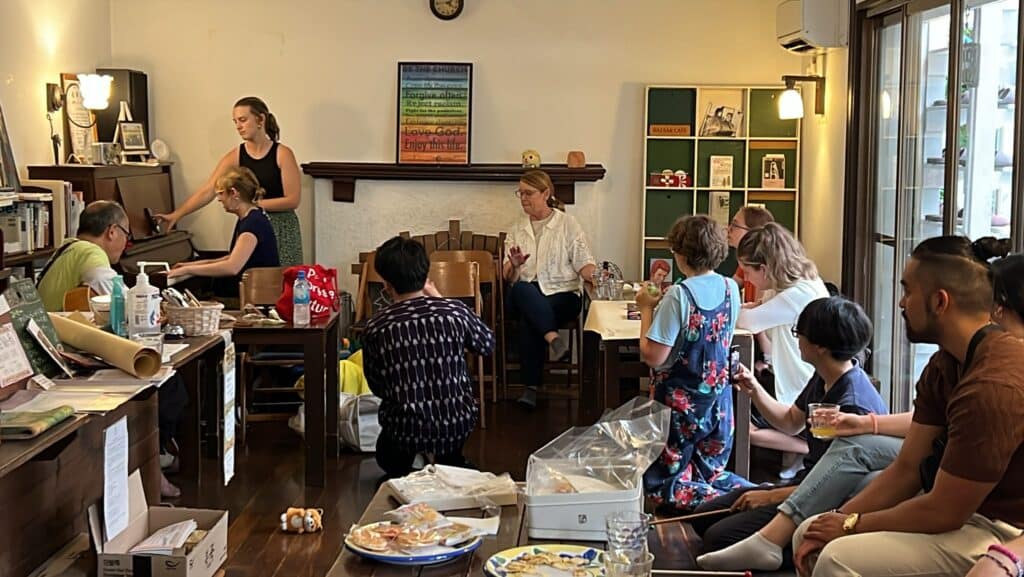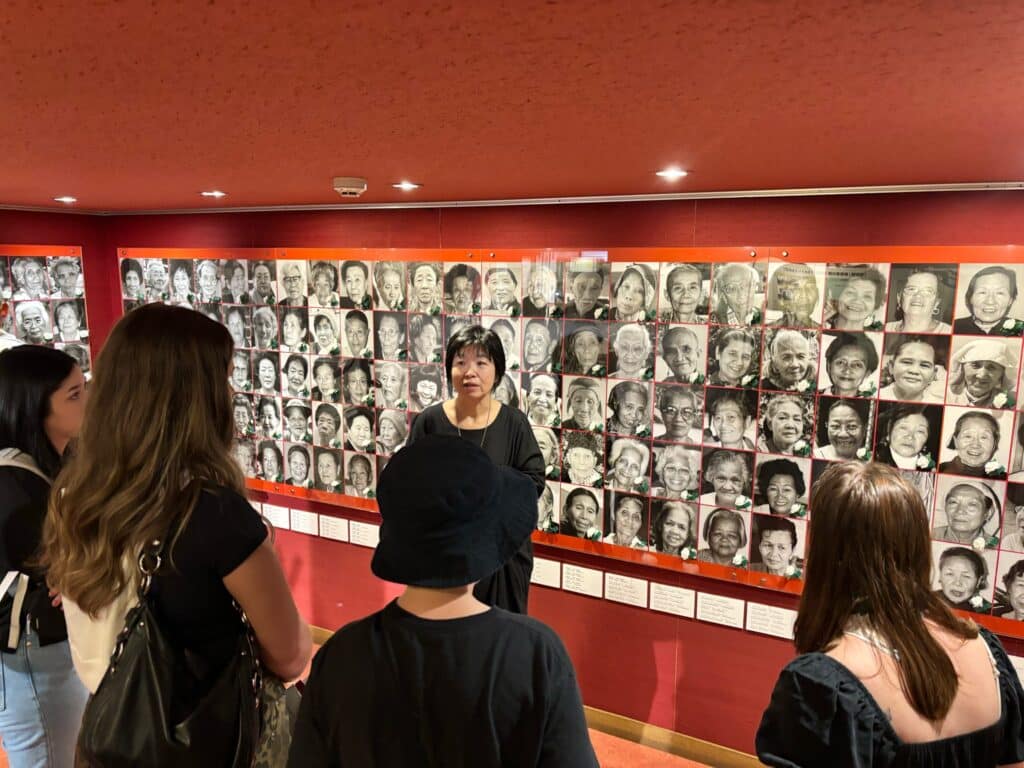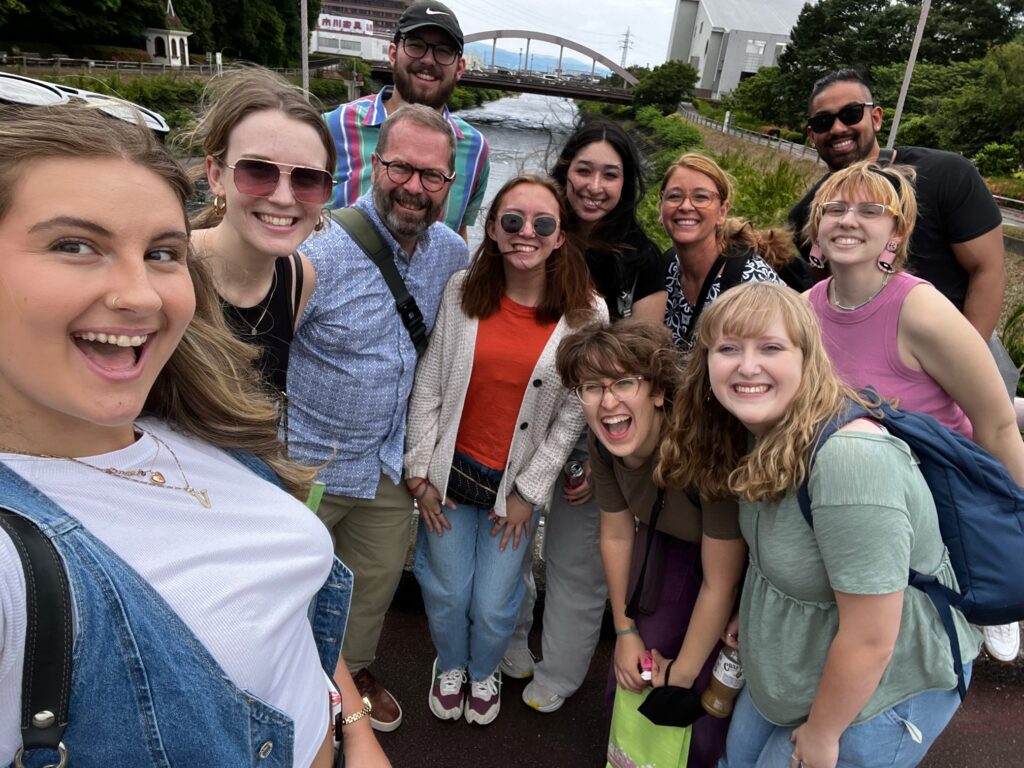Global Immersion: Reflections on Japan
In May, Higher Education Leadership Ministries and Global Ministries organized a pilgrimage for the HELM Leadership Fellows. In the third year of the program, students travel for abroad to visit with an international partner and learn more about the work of our partners and deepen their understanding of the Global Church. Read some of their reflections below.
One of the Higher Education Leadership Ministries (HELM) fellows, Ella Gordon, documented their cohorts immersion trip through a series of comics. Check out their work here.
My recent trip to Japan with Higher Education & Leadership Ministries was an incredible experience that provided me with so many new insights about my role as a Christian leader on a global scale. I made so many new connections and amazing memories that have greatly influenced my faith journey and growth as a leader. We began our trip to Japan by visiting the Asian Rural Institute (ARI), where we got to learn about the many different ways that they are implementing sustainable agricultural practices into their farms. This was one of my favorite parts of the trip since I’m studying environmental science and sustainability at my university. I got to connect with people from all over the world who have come to ARI to learn new skills on how to implement sustainable farming techniques in their rural communities back home. It was so powerful getting to worship in community with people who have come from so many different parts of the world. – Vasquez
Celebrating personal milestones, like my pretend graduation and Tamara and Ruthie’s birthdays, also added a special touch to our journey. These celebrations reminded me of the importance of cherishing individual moments, even when we are far from home.
I have thought a lot about interconnectedness during this trip. Experiencing this on a global scale was enlightening. For example, one take away was that many of us are struggling with the same core issues, even across country and cultural lines. At Bazaar Cafe, hearing a woman’s testimony about overcoming alcoholism through community acceptance was profoundly moving. Her story emphasized our shared struggles and desires. Ruthie mentioned “moments that make the world feel small,” which resonated with me. Traveling to Japan showed me the shared humanity in us all—we are all someone’s child, all fighting invisible battles, and finding joy in beautiful moments, big and small. Moving forward, I want to seek more “moments that make the world feel small.”
It was also amazing to see my cohort members lead morning devotionals, revealing their ministry gifts and stepping into leadership roles. Our time in conversation, both informally and formally within group conversations, led to deepened bonds of friendship. – Katie Madole

Our time in Japan was, for me, a time that allowed me to grow in my understanding of our rapidly and continually globalizing world. The time we spent in Japan- totally immersed in the culture of the places we went- was incredibly profound as we explored how Christianity functions in another country. A key moment for me was while we were in Japan, and we walked through a small museum outlining the children’s ministry of the Church in Japan, and the ways in which the Church stood in line with and defended/supported the Japanese government as they committed atrocities in the early and mid 20th century. Much of this museum was meant to explain and begin the reconciliation work the Church meant to do for the people of China, the Korean Peninsula, Japan, and all other people they may have affected. This was an impactful moment for me as we see the Church in the United States argue over the need for reconciling works and the beginnings of some of this work by some denominations of the United States. It allowed me to see what ways the Church in the US could begin to atone for its own participation in many of our governments disastrous policies and actions. -Hayden Skaggs
My favorite site visit was when we met with the staff at the Women’s Active Museum on War and Peace (WAM). It was an emotional, heavy presentation and tour of their exhibit as we learned about the horrors of “comfort women” who were kidnapped and routinely sexually assaulted by men in the Japanese military during World War II. This museum records the reality of the war crimes, tells the stories of women, and advocate “never again, anywhere in the world.” As a Women’s & Gender Studies Major at Hope College, I am interested in learning more about global feminist movements and how women outside of the U.S. engage with feminism. When I asked the woman presenting to us why she became involved at WAM, she said her involvement in the Japanese women’s movement in the 1980s sparked her passion for recording the testimonies of comfort women and raising public awareness of Japan’s history of military sexual violence. While this museum records the histories and stories of many women abused by the military during WWII, they acknowledge the many unnamed victims and women who were never able to publicly come forward. Most of the survivors have passed away now, but WAM serves as a powerful archive of women’s stories and experiences. – Anna Whittle

As we ate lunch with people from local churches in Hiroshima, Hayden Skaggs, another HELM fellow, brought over some paper so we could attempt to fold our own crane. We delicately formed the lines, laughing at our inability to perfectly shape the paper creature. One of the people eating with us laughed and shook his head, reaching in to show us the correct ways of folding. Before we knew it, we had a paper crane! Quickly the other HELM fellows and Japanese folks followed suit, working together to create paper cranes. Although there was a language barrier, we came together to create something that meant world peace. I mentioned to Miwako Sawada from the Hiroshima Peace and Culture Foundation how impressive it was to me that they all knew by heart how to make something so intricate. Miwako kindly replied, “Oh, people in Hiroshima, we know how to make paper cranes.” The actions of one little girl became a symbol for peace across the entire world. Her perseverance continues to inspire community building and action. This is just one of many examples of the fruitful connections we fostered with our Japanese siblings. Thank you to everyone who supports HELM to allow students like me to strengthen relationships with partners of the Christian Church (Disciples of Christ) while learning about our connections worldwide. -Ruthie Weeks


